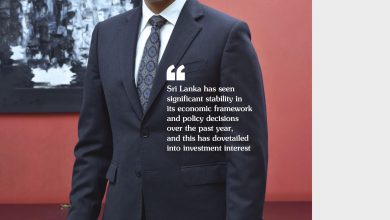LMDtv 2
 Sri Lanka’s tourism industry is witnessing a revival and treading a promising trajectory. Meanwhile, today’s travellers are seeking experiences beyond sun, sand and sea. The Group CEO of Minor International and CEO of Minor Hotels Dillip Rajakarier noted that travellers want to connect to the culture and locals, and enjoy seamless travel experiences.
Sri Lanka’s tourism industry is witnessing a revival and treading a promising trajectory. Meanwhile, today’s travellers are seeking experiences beyond sun, sand and sea. The Group CEO of Minor International and CEO of Minor Hotels Dillip Rajakarier noted that travellers want to connect to the culture and locals, and enjoy seamless travel experiences.
The commercial capital is a magnet for tourists and according to him, a hub that connects travellers to the rest of the country.
He noted in an interview aired on LMDtv that “the city draws tourists to the island. It offers a variety of experiences from culinary to wellness, and travellers can go from here to experience the rest of the island and its resorts.”
“Sri Lanka is quite small and it’s easy to get around. You don’t even need to take a flight – within a few hours, you can go from the beach to enjoy the tea trails in the hill country,” he noted.
Rajakarier added: “In Sri Lanka, everything is within driving distance. And if we can improve the infrastructure and logistics within the country, we can offer a seamless travel experience to today’s travellers.”
He stressed that it’s important for the country to attract multiple types of travellers.
“Every single traveller segment is important. You need to have high-end luxury travellers and at the same time, backpackers too. One day, it will be the backpackers who enjoy the luxury experience because people will backpack to explore the world. As they grow older or when they’re able to afford a little more, they’ll trade up,” he explained.
Balancing the various types of travellers is also important to manage tourist numbers: “If you look at travel, you have the high season, low season, shoulder season and peak season.”
“For example, in February you will have to attract Chinese travellers and during the Easter break, you’ll have to shift gears to the European segment. Then during the shoulder season, you will have to attract the meeting, incentives, conferences and exhibitions (MICE) segment. And at the end of the year and Christmas, you’ll have large numbers from Europe, China, India and Russia,” Rajakarier stated.
He asserted that “a delicate balance is necessary because you don’t want over-tourism – and you don’t want to kill the natural beauty of the country.”
The Group CEO of Minor International emphasised the importance of the government and private sector working together to “promote the destination in a balanced way.”
Positioning Sri Lanka the right way is also key. “In the past, people referred to Sri Lanka as a discount destination. Yet, when you’re promoting it as a discounted destination, you are undervaluing the country and also not attracting luxury travellers,” he said.
Rajakarier observed: “Private-public partnerships become key in terms of driving tourism and it’s important that we work together to promote tourism in regions where we really need travellers.”
Sri Lanka also has to balance its tourism establishments – both local and international. “I always believe that competition promotes and drives innovation,” he emphasised.
He noted: “Competition puts pressure on international and local operators to lift the game. Competition is good as long as the international and local operators don’t race each other to the ground by for instance, putting prices down or discounting, which is not healthy. Both international and local brands have to survive.”
“Local competition is good because they can provide that ultra boutique experience,” he averred.
Rajakarier elaborated: “There are some fantastic local brands here, and they are able to cherry-pick some of the island’s fantastic destinations and provide a really local authentic experience, which the international brands will not be able to do sometimes.”
“At the end of the day, both international and local brands need to survive, and it’s not about racing each other to the ground but to the moon,” he concluded.





